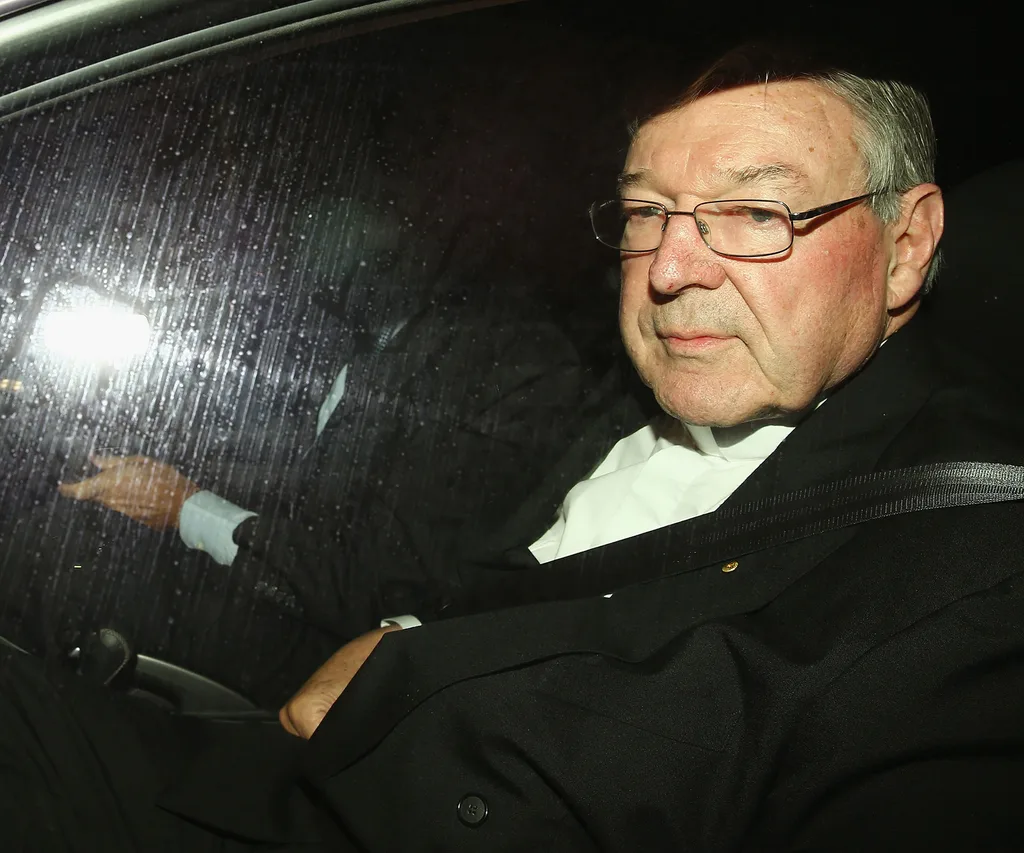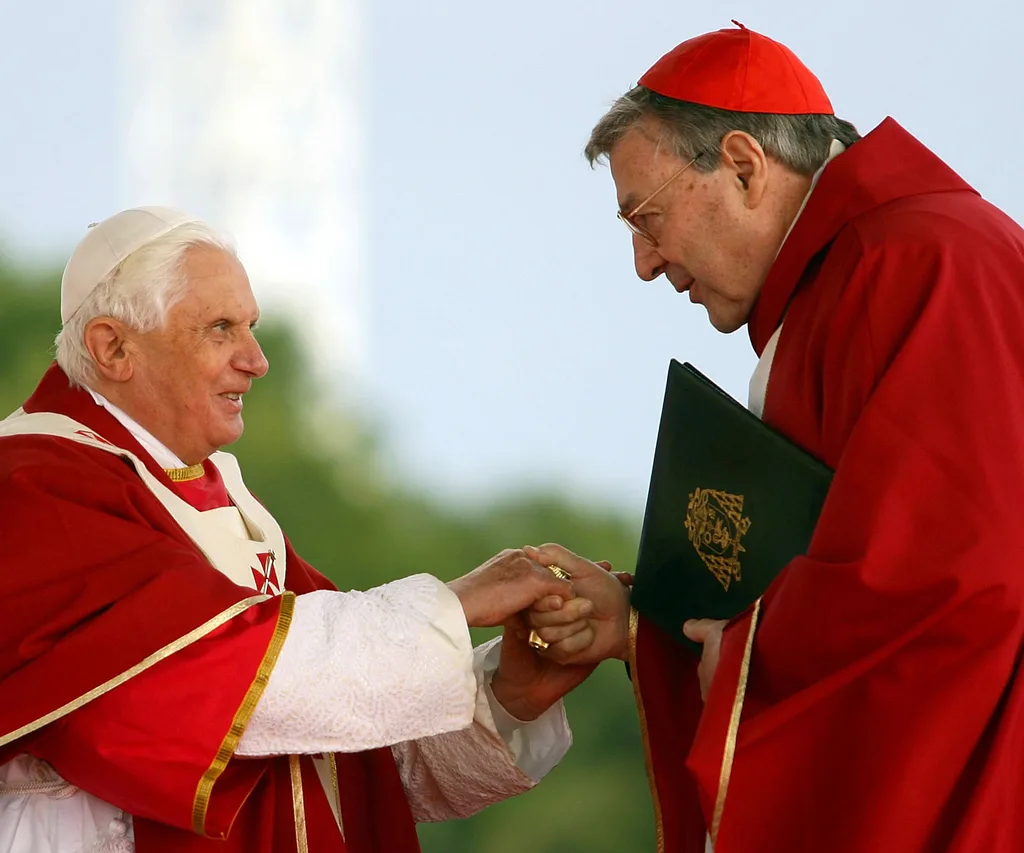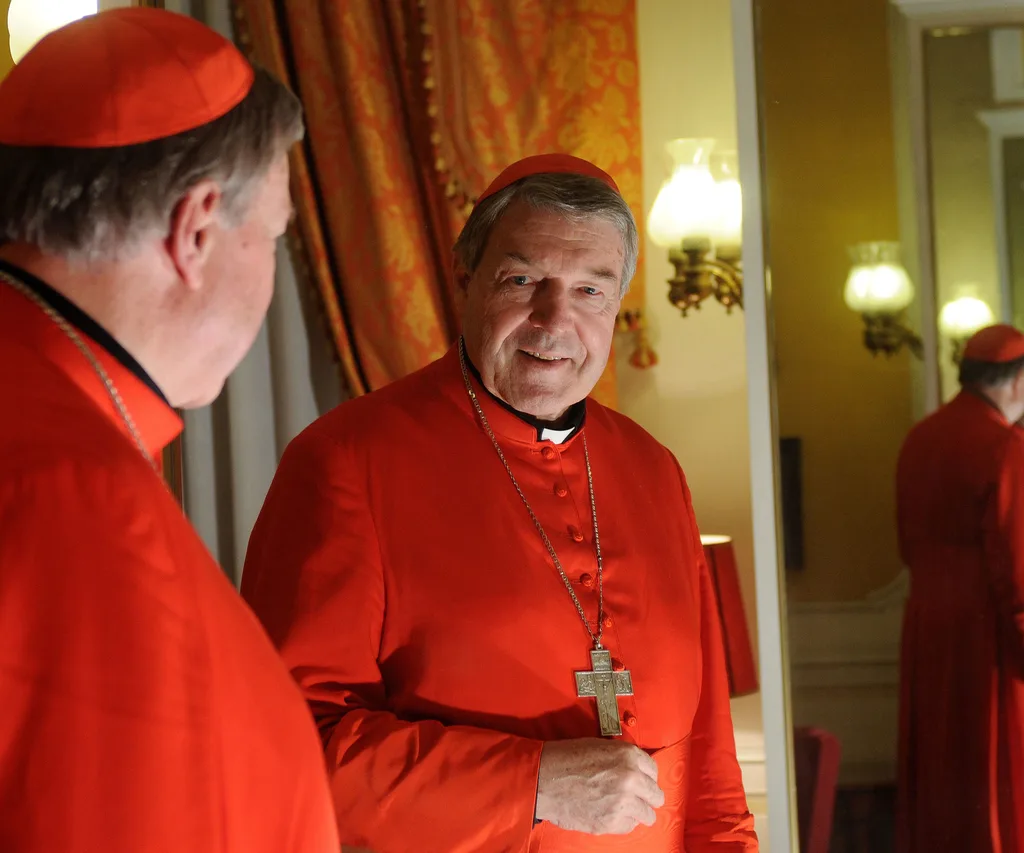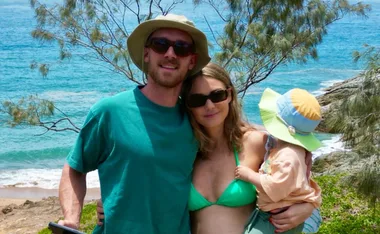George Pell turns 75 today and as such, tendered his resignation to the Pope, as is custom when Catholic bishops reach the milestone age. But as expected, Pope Francis rejected Pell’s appeal, asking the beleaguered Australian to continue working until 2019.
But is this the best move for the embattled religion? Australian icon Thomas Keneally asks could it be that Pell, champion of the Church, is its worst enemy?
In the past, Australians have seen the error in reading too much into the demeanour of a person under pressure.
Thirty-six years ago, we decided that a young woman whose baby had vanished at Uluru, and who said a dingo had taken her baby, didn’t show what we thought was appropriate grief. And so we witch-hunted her and condemned her, on astoundingly cock-eyed forensic evidence, to life imprisonment. We did not own up fully to our mistake until 32 years had passed.
Is His Eminence Cardinal George Pell – a Ballarat boy, who underwent operations as an infant to remove an abscess from his throat, who signed with Richmond as a star AFL prospect when an adolescent, but who chose to become a priest – also a victim of a witch-hunt?

Pell on his way to give evidence at the Royal Commission.
He has admitted he sometimes feels it. There are a number of commentators who try to tell us that he is. And perhaps he’s just temperamentally leaden, anyway, and doesn’t easily express the depth of his feelings. He can’t surely be blamed for that in itself.
However, I am sad to conclude that he does not deserve the benefit of these excuses. Admittedly, we, the mob, can be wrong. (See the disgrace of Nauru!) But in Pell’s case, I fear we’re right. Even though I come from something of the same sort of background as him and am a fellow old Australian codger, with so many flaws, failures and sins of my own, I think George Pell is a catastrophe.
On the matter of our background: I am 80, some five-and-a-half years older than George Pell. His mother was a Catholic of Irish descent; both my mother and father were, too. The Church was a huge part of our lives in our childhoods and the authority of priests and bishops was close to absolute, and backed up by God’s wrath. Pell went to the Christian Brothers; so did I.
He played Aussie Rules, I was mad for rugby league. Both of us decided about the age of 16 we wanted to be priests.
My motivation was immature, but based in part on the fact that most Catholics I knew were battlers. The Church I admired had a considerable amount to do with social justice – wages, schooling, opportunity for children.
I had never encountered paedophilia in my childhood and the worst scandal during my time in the same seminary that much later produced Tony Abbott, involved the fairly rare case of men who visibly fell for each other. Though a hetero male, I lasted some years in the seminary – I don’t quite believe it myself – and left, in the end, after losing faith in the idea of blind obedience and even in some of “the mysteries of faith”, as doctrines were called.
I lost faith also in the administration, when seminarians who grew mentally or physically ill were simply shuttled off for their families to deal with, some of our superiors suggesting we shouldn’t mix with them. Stuck between belief and scepticism, and genuinely shocked by the lack of justice with which many of the sick and damaged were treated, I suffered a crack-up. Leaving, I felt a failure.

Pell with Pope Benedict.
I was embarrassed, angry and isolated, and did what many people do under stress. I started writing. Writing novels is a very chancy card to play, the last in the pack. Yet it worked for me. Deo gratias, as we used to say. Thank God.
In our day, the Church and Catholics in general were aware that people were prejudiced against them. Born in distant 1935, I grew up in a world the younger Australian women reading this story would find hard to imagine. I knew that, as a Catholic with an Irish name, I belonged to a group which was mistrusted with a level of bigotry which these days is directed at so many honest Muslim families. But we were proud of our Irishness and our faith, brought to Australia by convicts and rebel priests from the Irish uprising of 1798.
One of these priests, Father Dixon, said the first recorded public Mass in Australia in 1803, his vestments of curtain material, his chalice a tin cup. Our forebears had survived political and religious persecution, and the Famine, which between 1845 and 1851 killed 1.5 million Irish and sent another 1.5 million fleeing on immigrant ships of any size and quality. We were confident we were true Australians, though bigots murmured that we were not.
Both my father, who served two-and-a-half years in the Middle East, and my brother-in-law, who was a much decorated member of a Pathfinder squadron, gave as a motivation for their serving the country that they wanted to show that Catholics were just as much Australian citizens as anyone. My brother-in-law was the great-grandson of two Irish convicts, by the way. In any case, in worship and, to an extent, in society, we kept ourselves to ourselves and wore any Church scandals close to our chest. Therefore, we had an instinct not to broadcast news of any priestly scandal.
George Pell grew up in that world and then lived to see Catholics of all backgrounds treated as fully paid up members of society. But obviously the instinct for secrecy is still there, combined with a bishop’s instinct to preserve the Church’s wealth from those seeking damages.
He feels, no doubt, a certain sympathy, which he would like us to see as compassion, but which fails to convince us. He looked upon the Melbourne Response, which he put in place in 1996 to deal with complaints in the Melbourne archdiocese, as a heroic answer to the problem.
He certainly boasted of it in his recent evidence transmitted from the Hotel Quirinale in Rome. Others, including victims and experts, have declared it a process of bullying, secrecy and damage control. I cannot sympathise with Cardinal Pell because he has never quite seen the urgency of addressing paedophilia as fully as he had attacked the supposed sins of laypeople. In his view of the world, we are definitely the fallen, whereas, as he pleaded in his most recent Royal Commission evidence, priests are just human beings. He’s got so much form in the double-standard business.
In Canada, in 2002, he told delegates to World Youth Day, “Abortion is a worse moral scandal than priests sexually abusing young people.” When challenged, he said that, of course, the abuse of young people by priests was a terrible thing. But, still, abortion was worse.
It is worth noticing that he is always being forced to put his rather astounding statements “in context”. Remember, he had to do just that in relation to Father Gerald Ridsdale’s abuse not being of interest to him.
His first statements are often so outrageous that he gets called out by the Commission and has to temper them. But he’s had lots of time to frame what he means and what he means is too often exactly what he says, and is too often appalling.
The sinner he chose to walk beside in fraternity to court in 1993 was the unspeakable Father Ridsdale. When Judgement Day comes, George Pell told the Commission, kindness to “those who are at the bottom of the pile like Ridsdale” would prove important.
Ridsdale wasn’t at the bottom of the pile. His victims were. The truth is that Cardinal Pell favours a structure of church governance which, according to his own evidence, echoes that of the Roman Empire and he himself was a grand figure in that Empire/Church. Cardinal Pell told the Commission that Ridsdale’s abuse was “a sad story” and that “it wasn’t of much interest to me”. He added, “I had no reason to turn my mind to the extent of the evils that Ridsdale had perpetrated.”

Pell
You could almost hear angels weeping as the Cardinal blandly gave this evidence. When my niece-in-law, Kristina Keneally, a good but not a dumb Catholic, commentating on the Sky News feed from the Commission, appeared on screen, she looked hollowed out and her face showed the shock that most believers in Australia were feeling.
Cardinal Pell has a limited eye for the sins of priests then, but he sure has a full-on one for the sins of the rest of us and of all our poor fellow pilgrims in the wider community. He was one of 13 Cardinals who wrote to the Pope last October accusing him of putting too many liberal-minded churchmen and laypeople into the synods of bishops which had met in Rome to discuss “the family”.
Cardinal Walter Kasper of Germany had seemed to be more lenient towards divorced Catholics – speaking of allowing them, that is, to receive Communion. George Pell could not permit this. “The sooner the wounded, the lukewarm and the outsiders realise that substantial doctrinal and pastoral changes are impossible,” he thundered, “the more the hostile disappointment [which will follow the assertion of doctrine] will be anticipated and dissipated.”
Catholics who are remarried civilly can be permitted to live together as “brother and sister” though, says Cardinal Pell, and if they manage that, they can go to Communion.
Cardinal Pell has held the line on homosexuals, too. Some people think that admirable, but like the line on divorced Catholics, it means there is no place at the altar rails for so many millions. Thus it appears, on his own evidence, that the Cardinal is more open to paedophile priests consecrating the host and taking Communion than he is to anyone divorced or gay, whatever their virtues, talents and goodwill, receiving the host.
The Church then is universal only for Pell and other total believers. Because women who use contraception don’t deserve a place in it either. He is on record (The Sydney Morning Herald, October 11, 2007) as saying that any Catholic who supports contraception, abortion and stem-cell research is guilty of a “Donald Duck heresy”. The Cardinal continued, “Too many Donald Ducks produce the feel-good society which works to remove personal guilt, anything that would make people feel uncomfortable, so that complacent self-satisfaction becomes a virtue.”
I know many women who have used contraception, merely in the sense that they speak frankly of it, and none of them has ever demonstrated the “complacent self-satisfaction” Cardinal Pell always manages to exude, no matter what suggestions of culpability are thrown in his direction.
In 2013, I had the honour of being given an honorary doctorate by the Catholic University of Australia. I was overwhelmed, having sometimes been critical of the Church, though I had always hung around like a bit of a desperado on its edges.
Just before I received this great honour, I read a piece by Cardinal Pell in which he claimed that only the good works all of those who acted in Christ’s name and within a structure of Catholic faith had any ultimate value. Good works undertaken by secular humanists were marked by unreliable moral relativism, that is, by choosing solutions that did not fit Divine Doctrine. Without faith, all charity was “coarse and uncaring”.
Having seen the work a non-Christian, avowed socialist like Fred Hollows has done in Africa, I know who I’d rather put my money on for delivering authentic human care. Through the lens factories Fred started in Asmara and elsewhere, he restored sight to millions of people who live in the less advantaged world.
Fred, when I knew him, travelled to East Africa while suffering from terminal cancer, sheltering by day from bombers in the Ethiopian Highlands, operating in hospitals I have seen, cave hospitals, where in the evening the generators came on and made surgery possible.
Fred did not believe in eternal life and gave his limited time to those he was connected to only by humane feeling. Whereas Cardinal Pell, who believes in an eternal after-life and does not have to travel on wild night roads in African mountains, could not travel to Australia for people he knew and who had suffered from his self-admitted negligence. I wonder which one will be seen either in the scales of heaven or of earth as the more “coarse and uncaring”.
It is not a surprise that this grand apparatchik of the Church should fail to heal wounds when he gave his evidence. Nor, I fear, is it a surprise that after long callousness, the Vatican itself could not initiate a meaningful meeting between the Pope and these damaged children from Australia.
The children, now grown, are the victims and that can’t be said with too much emphasis and feeling. But having been a seminarian myself, I do think of all the noble priests out there, who perform the sacraments as a humane and gracious exercise, who give sermons that are to do with humane tolerance, who reach from within their tradition to all other traditions and who use Catholicism not, as George Pell does, as an axe to exclude, but as a counsel of respectful love.
I might as well admit I have a book, finished last year, coming out later this year, about a “good” priest I knew, a whistle-blower, as some have been. Because leaders like Cardinal Pell have done so little to stop marauding and abusive clergy, the victims can never quite recover their happiness and wholeness. But due to the same failure, many admirable “ordinary” priests may never recover their repute.
And there are people, over 5 million of them in Australia, who count themselves as Catholics, who endured Cardinal Pell’s testimony. Some are so scandalised by these crimes and the way they have been addressed or otherwise that they walk away in disgust – as has happened so graphically in Ireland.
Other Catholics I know, like Kristina Keneally and the broadcaster Geraldine Doogue, stick to the broad ideals of their faith and say, “It’s our Church too, Pell doesn’t own it”. I admire them. But not all of us are subtle enough to make the subtle distinction between a Cardinal and the Church in which he has such authority. And, therefore, the question is this: could it be that Pell, champion of the Church, is its worst enemy?
Crimes Of The Father, by Thomas Keneally, will be published by Vintage in November.
This story originally appeared in the May 2015 issue of The Australian Women’s Weekly.

.png?resize=380%2C285)



.png?resize=380%2C285)




-(1).png?resize=380%2C285)
